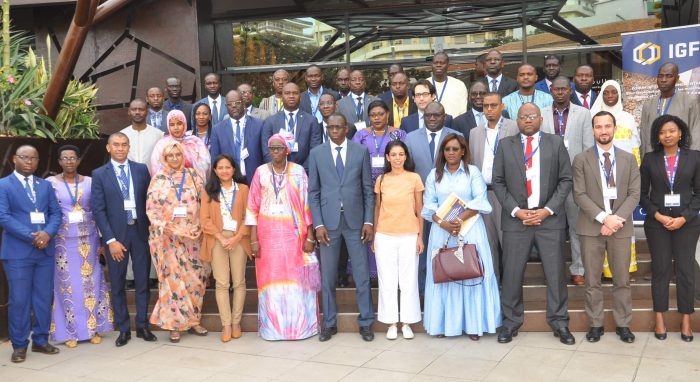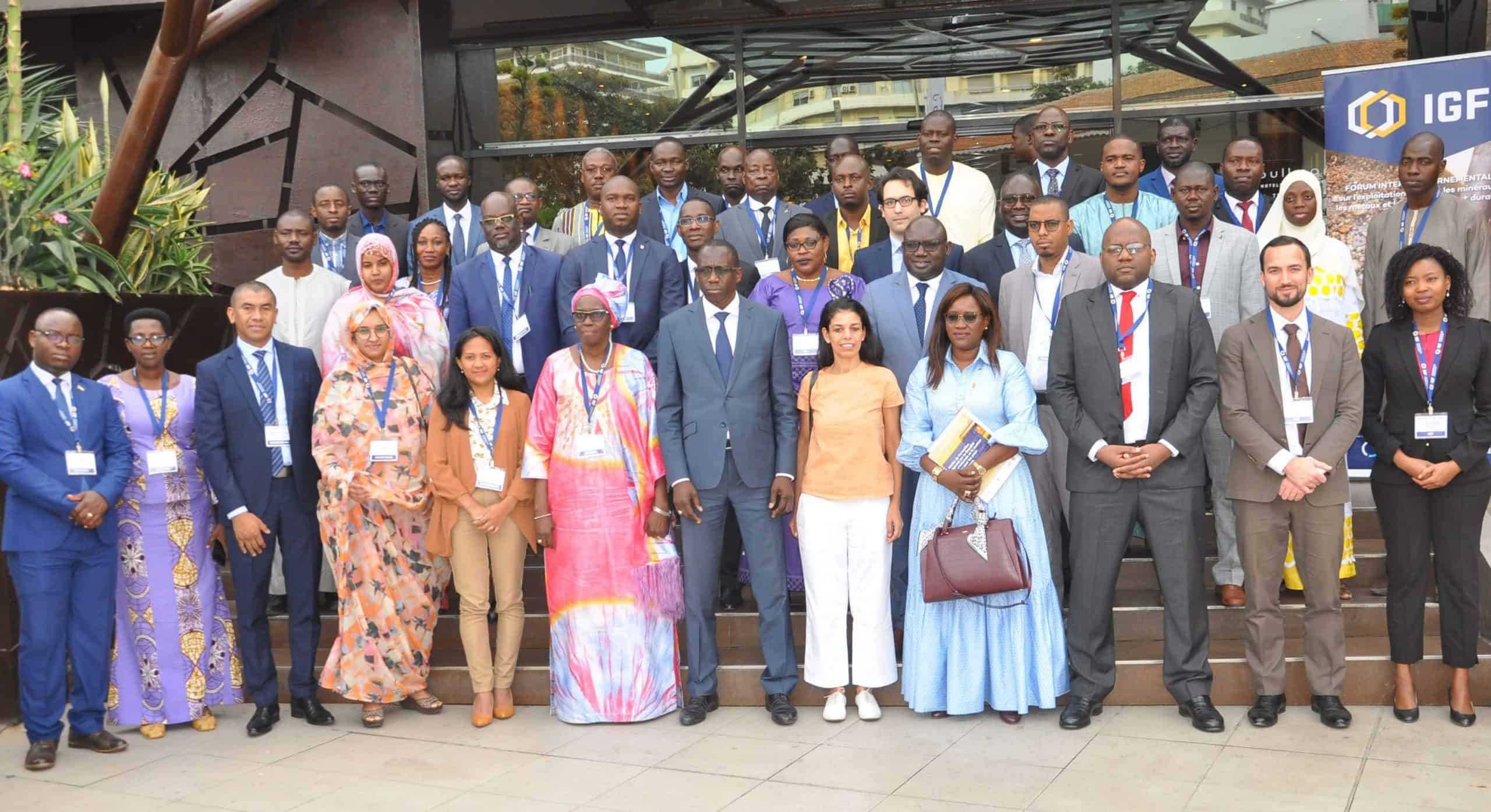** Français ci-dessous**
West Africa is becoming an increasingly popular destination for mining-related investments. There has been a boom in research and exploitation of bauxite, gold, diamonds, iron ore, nickel, zinc and phosphate, as shown by the excitement in Cape Town last week during the annual Mining Indaba conference.

Several West African states rely on tax revenues from the mining sector to support their economic development. Yet they have often faced numerous obstacles in doing so, such as in defining their tax policy appropriately or implementing the relevant legislation. To respond to these needs, the IGF and the OECD organized in Dakar a joint training workshop on base erosion and profit-shifting (BEPS) in the mining sector from January 21-24, 2020, bringing together more than 30 participants from nine countries from francophone Africa. This was the second such training, following one organized previously in Latin America in November 2019.
Facilitated by experts in international taxation and mining taxation, the training workshop addressed various themes especially relevant for African tax administrations. With a shorter history in industrial mining, many of these tax administrations have little experience with the sector. The themes of the workshop included tax incentives, transfer pricing issues involving the mining value chain, techniques for eroding the tax base based on the financing of mining projects, and the role of external mineral marketing structures. The opportunity to exchange regional experiences has helped foreground some useful practices to consider, which we highlight below.
Specialized Tax Auditors
Several countries already have a department dedicated to the auditing of companies in the mining sector, which is normally housed within the Large Taxpayers Division of their tax administration. This specialization enables tax auditors to perform more effective risk analyses and more in-depth and targeted audits, given their better knowledge of the mining sector.
Undertaking BEPS Measures
The implementation of BEPS action can help countries in the region better tackle the erosion of their respective tax bases. For example, Senegal has implemented Action 4 of the BEPS project by introducing a tax provision in 2018 that is designed to limit the deductibility of interest paid on related-party loans to 15% of the company’s earnings before interest, tax, depreciation and amortization (EBITDA). Such a measure can have important implications for the mining sector, where borrowing levels can reach colossal heights.
Regional Collaboration
Regional collaboration can offer helpful opportunities in various areas, such as by allowing government agencies to pool the often limited resources needed for undertaking laboratory analysis of minerals; working toward international certification; or creating a regional database on the costs of mining companies that would provide administrations with better comparable data for the analysis of transfer prices.
Questioning Tax Incentives
Many countries have traditionally provided significant tax incentives for mining projects without performing robust analyses of the effectiveness and efficiency of these measures. The recent trend has been to question the costliest tax exemptions. Côte d’Ivoire and Senegal have both recently ended their tax breaks for their respective mining sectors.
Along with these trainings, the IGF and OECD provide advisory and capacity building services to countries in the region as they work to reinforce their legal frameworks and their capacity for implementing measures that address base erosion and profit-shifting.
For more information, please contact secretariat@igfmining.org or ctp.communications@oecd.org.
Érosion des bases d’imposition et transferts de bénéfices dans le secteur minier en Afrique francophone
L’Afrique de l’ouest est une destination de plus en plus prisée pour les investissements miniers. Bauxite, or, diamants, minerais de fer, nickel, zinc, phosphate – la recherche et l’exploitation de ces minerais connait une véritable envolée, comme le montre l’engouement suscité à Cape Town la semaine passée, pour la conférence annuelle Mining Indaba.

De nombreux Etats cherchent à s’appuyer sur les recettes fiscales issues du secteur minier pour financer leur développement économique, et font face à cet égard à de nombreux obstacles, que ce soit dans la définition de leur politique fiscale ou la mise en œuvre de la législation. Pour répondre à ces besoins, IGF et l’OCDE ont organisé conjointement à Dakar un atelier de formation sur l’érosion de la base d’imposition et les transferts de bénéfices dans le secteur minier, du 21 au 24 janvier 2020, réunissant plus de 30 participants issus de neuf pays d’Afrique francophone. Il s’agissait de la seconde formation de ce type, après celle organisée en Amérique latine en novembre 2019.
Animé par des experts en fiscalité internationale et fiscalité minière, l’atelier de formation a abordé des thèmes pertinents pour les administrations fiscales africaines tels les incitations fiscales, les problématiques de prix de transfert autour de la chaine de valeur minière, les techniques d’érosion de la base d’imposition basées sur les financements des projets miniers, ou le rôle des structures externes de commercialisation des minerais. Le partage d’expériences régionales entre administrations ayant différents niveaux de familiarité avec le secteur minier a également permis de faire émerger des pratiques intéressantes, que nous souhaitons mettre ici en avant :
Spécialisation des vérificateurs fiscaux
Plusieurs pays disposent déjà d’un service dédié au contrôle des entreprises du secteur minier au sein de la Direction des grandes entreprises de leur administration fiscale. Cette spécialisation permet aux vérificateurs fiscaux de réaliser des analyses de risques plus performantes, et d’effectuer des contrôles plus approfondis et mieux ciblés compte tenu de leur meilleure connaissance du secteur minier.
Mise en œuvre des mesures BEPS
La mise en œuvre de certaines mesures issues du Projet OCDE/G20 BEPS peut aider les pays de la région à mieux lutter contre l’érosion de leur base d’imposition. A titre d’illustration, le Sénégal a mis en œuvre l’action 4 du projet BEPS en introduisant en 2018 dans sa législation interne une disposition fiscale visant à limiter la déductibilité des intérêts versés sur les prêts entre sociétés appartenant à un même groupe à 15% de l’EBITDA. Une telle mesure peut avoir un impact important dans le secteur minier, où les emprunts peuvent être colossaux.
Collaboration régionale
La collaboration régionale offre des perspectives intéressantes dans plusieurs domaines tels la mise en commun de ressources administratives souvent limitées dans l’analyse en laboratoire des minerais, visant une certification internationale, ou encore, la création d’une base de données régionale sur les coûts des sociétés minières qui permettrait aux administrations de disposer de meilleures données comparables pour l’analyse des prix de transfert.
Remise en cause des incitations fiscales
De nombreux pays ont traditionnellement accordé d’importantes incitations fiscales aux projets miniers, sans véritablement analyser l’efficacité et l’efficience de ces mesures. La tendance récente est à la remise en cause des exonérations les plus coûteuses. La Côte d’Ivoire comme le Sénégal ont récemment mis fin aux exonérations d’impôt sur les bénéfices accordées jusqu’ici au secteur minier.
Au-delà des formations régionales, IGF et l’OCDE accompagnent les pays de la région dans le renforcement de leur cadre juridique et des capacités de mise en œuvre de mesures de lutte contre l’érosion de leur base d’imposition et les transferts de bénéfices.
Pour plus d’information, merci de contacter secretariat@igfmining.org ou ctp.communications@oecd.org.

